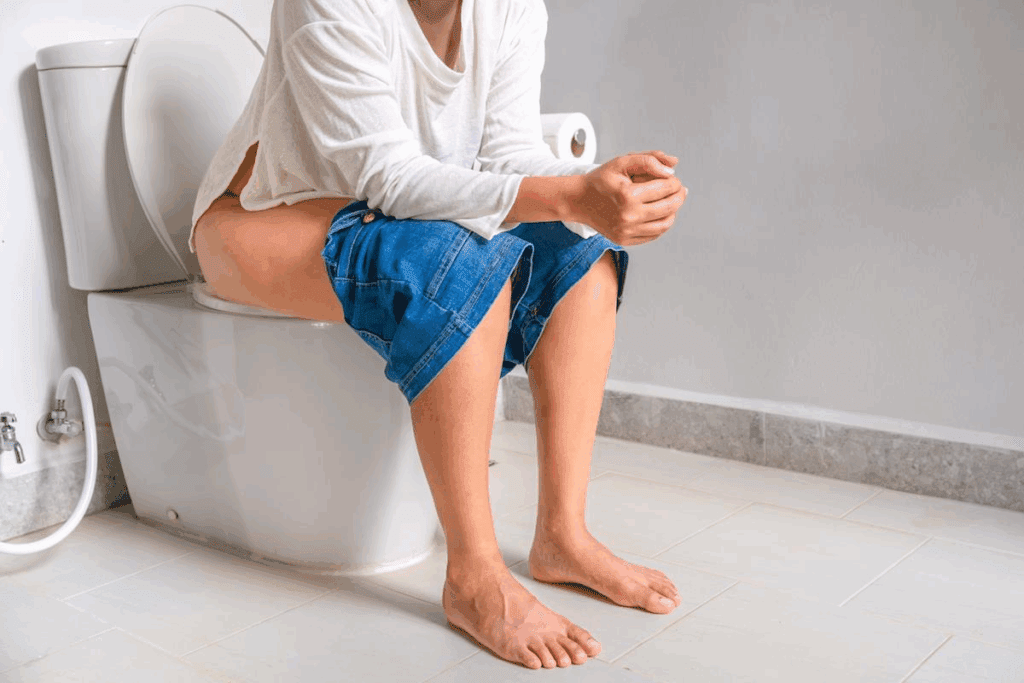
The link between constipation and bowel or colon cancer has been a topic of debate in medical circles.Learn whether does constipation cause bowel cancer and what recent research really shows.
Recent studies hint at a possible, though weak, connection between constipation and a higher risk of colorectal cancer (CRC).
Colon cancer starts with abnormal cell growth in the colon’s lining. It often begins as small polyps.
Key Takeaways
- The connection between constipation and colorectal cancer is under investigation.
- Colon cancer usually starts as polyps in the colon.
- Knowing the risk factors can aid in early detection.
- Recent studies suggest a possible weak causal link.
- Clear information is key for making health choices.
Understanding Constipation and Colorectal Cancer

Constipation and colorectal cancer have a complex relationship. Constipation is when stool moves slowly through the large intestine, making it hard and dry. It’s common, hitting many people, but more so in older adults.
Defining Constipation and Its Prevalence
Constipation is a common issue with bowel movements. It makes it hard to pass stools or go to the bathroom often. About 15% to 20% of the U.S. population deals with it, and it gets worse with age. Diet, lifestyle, and some health issues can cause it.
Overview of Colorectal Cancer Statistics
Colorectal cancer is a big deal in the U.S. It’s the third leading cause of cancer deaths for both men and women. Most cases happen in people over 50. The American Cancer Society says there will be a lot of new cases each year, making screening key.
Why These Conditions Are Often Discussed Together
Research shows a possible link between constipation and colorectal cancer. The exact reason isn’t clear, but several theories exist. One idea is that constipation exposes the body to harmful substances longer. Changes in the gut and inflammation might also play a part. Knowing how these conditions relate can help find ways to prevent and catch cancer early.
The Theoretical Connection Between Constipation and Cancer Risk

Constipation might affect colorectal cancer risk in several ways. This link is complex and involves changes that could lead to cancer.
The connection between constipation and colorectal cancer is complex. It involves prolonged exposure to harmful substances, changes in the gut microbiome, and chronic inflammation.
Extended Exposure to Potent Carcinogens
Chronic constipation can cause extended exposure to harmful substances in the stool. This means the harmful substances stay in the colon longer. This could increase the risk of genetic mutations and damage to cells, leading to cancer.
Changes in Gut Microbiome and Bacterial Composition
Constipation can change the gut microbiome and bacterial mix. The gut microbiota is key to keeping the colon healthy. Changes in it can lead to diseases. Research shows that an imbalance in gut bacteria, or dysbiosis, may increase cancer risk by producing harmful substances or affecting inflammation.
Chronic Inflammation and Tissue Damage
Chronic inflammation is a known risk factor for colorectal cancer. Constipation can cause long-term irritation and inflammation in the colon. This can damage tissues and increase cancer risk. The process involves complex interactions between inflammatory cells, cytokines, and the colon’s lining.
In summary, while the direct link between constipation and colorectal cancer is not fully understood, several mechanisms suggest a connection. Understanding these mechanisms is key to assessing risk and finding ways to prevent it.
Does Constipation Cause Bowel Cancer? Examining the Evidence
Recent studies have looked into if constipation can lead to bowel cancer. This question is complex and has been studied a lot in medicine.
Correlation vs. Causation in Medical Research
It’s hard to say if constipation causes bowel cancer because of the difference between correlation and causation. Many studies have found links between the two, but proving a direct cause is tricky.
A study in a well-known medical journal said, “An association doesn’t always mean causation. We must think about biases and other factors carefully.”
“The presence of an association does not necessarily imply causation, and careful consideration of possible biases and confounding variables is essential.”
Journal of Clinical Epidemiology
2023 Mendelian Randomization Analysis Findings
A 2023 study using Mendelian randomization found a weak link between constipation and colorectal cancer. It showed a small genetic link, but the results were not strong.
This study is helpful because it uses genetics to look at causality. It helps reduce the effects of other factors and reverse causation.
Limitations of Current Research Models
Even though the 2023 study gave insights, there are limits to current research. It relies on genetic data, which might not fully show the relationship between constipation and bowel cancer.
Also, different study groups and how constipation and CRC are defined can make comparing studies hard.
| Study Type | Findings | Limitations |
| Mendelian Randomization Analysis | Weak causal link between constipation and CRC | Reliance on genetic data |
| Case-Control Studies | Association between constipation and CRC | Recall bias, selection bias |
| Cohort Studies | Long-term data on constipation and CRC risk | Heterogeneity of study populations |
In conclusion, there’s evidence of a link between constipation and bowel cancer. But, more research is needed to understand this relationship fully.
Review of Major Studies on Constipation and Colorectal Cancer
Studies on constipation and colorectal cancer have shown mixed results. This section looks at major studies, focusing on case-control, cohort, and meta-analyses.
Case-Control Studies and Their Findings
Case-control studies have explored the link between constipation and colorectal cancer. They compare people with cancer to those without. Many studies found no link between constipation and colorectal cancer after adjusting for other factors.
A study in the Journal of the National Cancer Institute found no link. It suggests other factors might explain some findings.
Cohort Studies and Long-Term Data
Cohort studies track groups over time. They offer insights into the long-term relationship between constipation and colorectal cancer. Some studies found a positive association, while others did not.
A study in Gastroenterology followed over 100,000 people. It found no increased risk of colorectal cancer in those with constipation.
Meta-Analyses and Systematic Reviews
Meta-analyses combine data from many studies. A meta-analysis in the American Journal of Gastroenterology found no overall link. It combined data from several cohort studies.
But, the quality of evidence varied. Different definitions of constipation and study populations affected the results.
In summary, while some studies suggest a link, most high-quality studies do not support a direct cause. Ongoing research aims to better understand this complex relationship.
Primary Risk Factors for Colorectal Cancer
Colorectal cancer is caused by genetics, lifestyle, and environment. Knowing these factors helps find who’s at risk. It also helps in taking steps to prevent it.
Genetic and Family History Factors
Genetics and family history are key in colorectal cancer risk. People with a family history or certain genetic syndromes like Lynch syndrome or Familial Adenomatous Polyposis (FAP) face higher risks.
Key Genetic Factors:
- Family history of colorectal cancer
- Genetic syndromes like Lynch syndrome and FAP
- Personal history of colorectal cancer or polyps
“A family history of colorectal cancer, specially in first-degree relatives, significantly increases an individual’s risk. Genetic counseling and screening are recommended for those with a known family history or genetic predisposition.”
NCCN Guidelines
Lifestyle and Dietary Influences
Lifestyle and diet also play a part in colorectal cancer risk. Eating a lot of red and processed meats, and not enough fruits and veggies, can raise risk. Being inactive, obese, or smoking also increases risk.
| Lifestyle Factor | Impact on Colorectal Cancer Risk |
| Diet high in red and processed meats | Increased risk |
| Low fiber intake | Increased risk |
| Physical inactivity | Increased risk |
| Obesity | Increased risk |
| Smoking | Increased risk |
Medical Conditions That Increase Risk
Some medical conditions raise colorectal cancer risk. These include inflammatory bowel diseases like Crohn’s disease and ulcerative colitis. Diabetes is also a risk factor.
People with these conditions should follow screening guidelines. They should also talk to their healthcare provider about their risk.
Symptoms That Shouldn’t Be Ignored
Persistent constipation is more than just a digestive issue. It can be a sign of colorectal cancer. While occasional constipation is normal, chronic constipation might mean there’s something wrong that needs a doctor’s help.
When Constipation May Signal Something Serious
Constipation can be a sign of bowel or nearby cancers. If you have constipation that won’t go away, along with pain, bloating, or weight loss, see a doctor.
Key indicators that constipation may signal something serious include:
- Severe and persistent constipation
- Blood in the stool or black, tarry stools
- Abdominal pain or cramping
- Unexplained weight loss
- Fatigue or weakness
Warning Signs of Colorectal Cancer
Colon cancer symptoms include changes in bowel habits, rectal bleeding, and belly pain. Knowing these signs can help catch cancer early.
“The most common symptoms of colorectal cancer include a change in bowel habits, blood in the stool, and persistent abdominal discomfort.” – American Cancer Society
Common warning signs include:
| Symptom | Description |
| Change in bowel habits | Constipation or diarrhea that persists |
| Rectal bleeding | Blood in the stool or black, tarry stools |
| Abdominal discomfort | Ongoing pain or cramping in the abdomen |
Differentiating Between Common Constipation and Cancer Symptoms
Telling common constipation from cancer symptoms can be hard. But, how long and how bad the symptoms are, and other signs, can help figure it out.
If you’re experiencing any of the following, seek medical attention:
- Constipation that lasts more than a few days
- Severe abdominal pain
- Rectal bleeding or blood in the stool
- Unexplained weight loss or loss of appetite
It’s important to know the difference between normal constipation and signs of colorectal cancer. This can lead to early detection and better treatment.
When to Consult Healthcare Providers
Knowing when to talk to healthcare providers about bowel habits is key for colorectal health. Early treatment of constipation can stop serious issues. This includes avoiding complications linked to colorectal cancer.
Concerning Changes in Bowel Habits
Changes in bowel habits can happen normally, but some signs are a warning. These include ongoing constipation, diarrhea, or alternating between the two. Also, seeing blood in the stool or unexplained weight loss with bowel habit changes is a sign to see a doctor.
“Don’t ignore persistent changes in bowel habits,” advises a gastroenterology specialist. “Early check-ups can lead to quick action.”
Recommended Screening Schedules
Doctors suggest starting colon cancer screening at age 45 for those at average risk. This can include colonoscopy, the top test for finding colorectal cancer. The screening plan may change based on your risk factors, like family history or past findings.
- For those at average risk, screening starts at 45.
- Those with a family history or other risk factors may start screening earlier.
- How often you need screening depends on the test type and your past results.
What to Expect During a Colorectal Evaluation
During a colorectal check-up, doctors may do several tests to look at your colon’s health. This might include a colonoscopy, where a tube with a camera looks inside your colon. Other tests might be imaging studies or stool tests for hidden blood or other issues.
Preparation for these tests usually means changing your diet and possibly bowel prep for accurate results. Your doctor will help you prepare and explain what to expect during and after the test.
In summary, knowing about bowel habit changes and following screening schedules are vital for colorectal health. Talking to healthcare providers on time can greatly help in early detection and prevention of colorectal cancer.
Preventing Colorectal Cancer: Evidence-Based Approaches
To prevent colorectal cancer, it’s important to know and use proven strategies. These include screening and making lifestyle changes. By doing these things, people can lower their risk of getting colorectal cancer.
Screening Methods and Their Effectiveness
Screening is key in preventing colorectal cancer. There are many screening methods, each with its own benefits and when to use them.
- Colonoscopy: This is the top choice for screening. It lets doctors find and remove polyps before they turn into cancer.
- Fecal Occult Blood Tests (FOBT): FOBT finds hidden blood in the stool, which can be a sign of cancer early on.
- Sigmoidoscopy: This test looks at the lower colon. It’s less invasive than colonoscopy.
Dietary and Lifestyle Modifications
What you eat and how you live can help prevent colorectal cancer. Making healthy choices can lower your risk.
Eating a variety of fruits, vegetables, and whole grains is good. These foods are full of fiber, vitamins, and minerals that protect the colon.
- Increase Fiber Intake: A diet high in fiber can lower your risk of colorectal cancer.
- Maintain a Healthy Weight: Being overweight or obese raises your risk of colorectal cancer.
- Stay Physically Active: Regular exercise can also help lower your risk.
Managing Constipation for Overall Colon Health
Constipation can harm colon health. It’s important to manage it well to prevent colorectal cancer.
- Adequate Hydration: Drinking enough water helps avoid constipation.
- Dietary Changes: Eating more fiber can help manage constipation.
- Physical Activity: Regular exercise can also help with bowel movements.
By using these proven methods, people can take steps to prevent colorectal cancer and keep their colon healthy.
Managing Chronic Constipation Effectively
Managing chronic constipation means knowing its causes and using different strategies. This includes changing your diet and using medical treatments. It’s a common issue that can really affect your life, so it’s important to tackle it head-on.
Fiber, Hydration, and Physical Activity
Boosting fiber intake is key in fighting constipation. Fiber makes stool softer and bigger, making it easier to move. Foods high in fiber are fruits, veggies, whole grains, and legumes. Also, drinking enough water is important as it softens stool and helps it move through your system.
Moving your body is also vital. Exercise can help get your bowels moving and improve gut health. Even simple activities like walking can help.
Over-the-Counter and Prescription Treatments
For some, diet and exercise aren’t enough, and medical treatments are needed. Over-the-counter laxatives can help by softening stool or getting things moving. But, it’s important to use them wisely and only as directed by a doctor to avoid getting too reliant on them.
If these don’t work, prescription meds might be suggested. These can include newer drugs that help with fluid in the intestines or improve how the gut moves.
Addressing Underlying Causes
Managing chronic constipation also means finding and fixing the root causes. This could be due to conditions like hypothyroidism, diabetes, or neurological issues. Also, look at any meds that might cause constipation as a side effect and see if they can be changed.
A doctor can figure out what’s causing your constipation with a thorough check-up. This might include tests to find out if there’s a structural or metabolic issue.
Conclusion: Putting Constipation and Cancer Risk in Perspective
Understanding the link between constipation and colorectal cancer is complex. While there might be a connection, the proof is not clear. Studies show that genetics, lifestyle, diet, and family history are the main risk factors for colorectal cancer.
Looking at cancer risk means considering these factors carefully. Constipation, though uncomfortable, is just one part of colon health. By changing diet, staying hydrated, and being active, you can lower your risk of colorectal cancer.
Living a balanced life and knowing the main risk factors helps prevent cancer. Regular health checks and screenings are key to catching and stopping colorectal cancer early. Seeing constipation and cancer risk in the right light helps people make better health choices.
FAQ
Can constipation cause bowel cancer?
Some studies suggest a link between constipation and colorectal cancer. But, the evidence is not strong enough to prove a direct cause.
Does chronic constipation increase the risk of colon cancer?
Research on chronic constipation and colon cancer risk is ongoing. The results are mixed, and more studies are needed.
Can constipation lead to colon cancer?
Current evidence does not show constipation directly causes colon cancer. But, it might be linked to other factors that raise cancer risk.
Is there a link between constipation and colorectal cancer?
Studies have looked into the connection between constipation and colorectal cancer. Some suggest a link, while others find no strong association.
Can managing constipation help prevent colorectal cancer?
Good bowel habits and managing constipation might help keep the colon healthy. But, their role in preventing colorectal cancer is not proven.
What are the primary risk factors for colorectal cancer?
Risk factors for colorectal cancer include genetics, family history, lifestyle, and diet. Certain medical conditions also play a role.
When should I consult a healthcare provider about changes in bowel habits?
See a doctor if you have persistent or severe bowel changes. This includes constipation, diarrhea, or blood in the stool.
What are the warning signs of colorectal cancer?
Signs of colorectal cancer include changes in bowel habits, blood in the stool, and abdominal pain. Unexplained weight loss is also a warning sign.
How can I reduce my risk of developing colorectal cancer?
To lower your risk, get regular screenings and make healthy lifestyle choices. Eat well, stay active, and manage any health conditions.
Does colon cancer cause constipation?
Colon cancer can lead to constipation as the tumor grows. But, constipation can have many causes, not just colon cancer.
Can constipation be a symptom of bowel cancer?
Constipation can be a symptom of bowel cancer, but it’s not a clear sign. Other symptoms and tests are needed to confirm the disease.
What is the role of screening in preventing colorectal cancer?
Screening is key in catching colorectal cancer early. It helps remove polyps and find cancer when it’s easier to treat.
References
Gustafsson, U. O., et al. (2025). Guidelines for perioperative care in elective colorectal surgery: Enhanced Recovery After Surgery (ERAS) Society recommendations. Clinical Nutrition. https://www.sciencedirect.com/science/article/pii/S0039606025002491



































